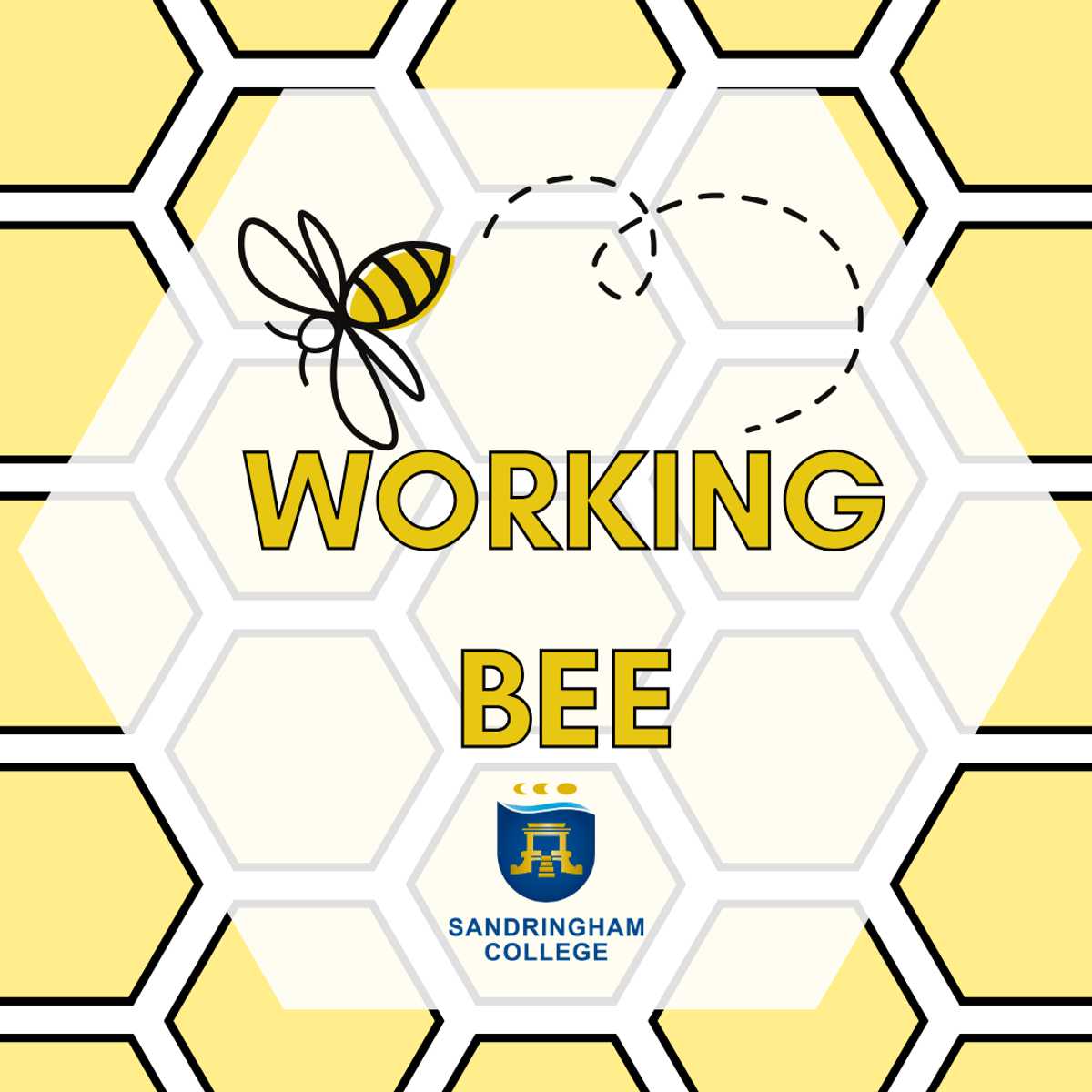Principal's News
David Hall - Acting College Principal

Principal's News
David Hall - Acting College Principal
It’s a great question — and the answer reflects just how dynamic this term has been at Sandringham College. Over the past 12 weeks (including our two weeks of Head Start), we’ve achieved an incredible amount. Some of these accomplishments are highly visible, while others reflect the behind-the-scenes work that keeps our school thriving.
So, what have we done?
Through it all, we’ve maintained our unwavering commitment to high expectations and high support, continuing to drive academic growth and personal success for every student in our care.
Here’s to an even more exciting and rewarding term ahead!


We need your help at our biggest Working Bee of the year at Bluff Road Campus on Sunday, April 27th, starting at 9am, as we get our school looking its best for Annual Open Night on April 30th!
We’re calling on all champions of gardening, cleaning, painting, tidying, and general sprucing-up to lend a hand. Got a wheelbarrow? Bring it along, it’s time to put those DIY skills (or at least your ability to hold a broom) to good use!
Your support will make a huge difference, and to keep you fuelled, we’ll have a few treats on hand. Think coffee, snacks, and maybe even a mystery baked good (no promises on artistic presentation).
Join us for a morning of hard work, good laughs, and a chance to make the campus shine!
Our school tours have been in high demand and are fully booked until May, running twice a week to give prospective families an insight into life at Sandringham College.
In addition, our Annual Open Night is just around the corner—an exciting chance to explore all that makes our school community so special.
Further details can be found below:


Below is some information taken from the Department of Education. This student-facing document explains to students why they need to attend school. This should be read in conjunction with the College's Attendance Policy which can be found on our website, as well as the VCE/VCE-VM Handbook, also available on our website.
If your child refuses to go to school, please do not enter medical or other reasons for their absence. If you, as a parent/carer, have done everything you can to encourage your child to return to school, but this still refuse, we need to know. Please enter the absence as Truancy on Compass and contact your child's Year Level Leader to discuss how we can help. We are here to support you in getting your child engaged in education, so please work with us!
Yes. School in Victoria is compulsory until you turn 17.
Missing one day every fortnight is equivalent to missing 4 whole weeks of school in a year.
From Foundation to Year 12, that adds up to 1.5 years of school.
Apart from this, school is better when you attend. Your friends and your teachers notice your absence and wonder if you’re OK.
Right now, attending school is your most important job. You are building habits that will last into adulthood.
While it might not seem obvious, when you come to school, you're learning more than just Maths and English. You’re also developing skills like teamwork and meeting deadlines, which will help you later in life.
If you can’t show up to school every day, how will you learn to show up for work?
Being at school every day also means you are involved in your own learning, interacting with other students and teachers, and being part of an environment that is motivating and stimulating.
You can get help from your teachers and friends and won’t have to try to learn things or catch up on your own.
There is also significant evidence showing that young people who attend school more frequently have better outcomes after school.
They tend to earn more money, have better job prospects, are less likely to misuse drugs and alcohol, and are generally healthier.
Yes. Your parents need to notify the school of your absence as soon as possible. If they know in advance that you will be away, they should notify the school before the absence occurs. The school will then decide if the absence is approved, according to the attendance policy.
If you're absent and the school hasn’t heard from your parents, they will try to contact them as soon as possible on the day you’re away. If you’re away from school too much and don’t have a reasonable excuse like a serious illness, your parents can also get in trouble.
Many schools have their own attendance requirements. This means you might pass a subject academically but fail if you’ve missed too many classes. This is especially true for VCE and VCE-VM.
Be sure to familiarise yourself with the school’s attendance policy to avoid unintentionally getting into trouble.
Basically, no. Unless you are too sick to get out of bed or there is a significant event, like a funeral, you should be at school. Every day you miss is a day of classes and social connections that you're missing out on.
Even medical and health appointments should be made either before or after school or during school holidays. This includes family holidays. Parents are encouraged not to plan holidays during the term, but instead, to organise these during the school holidays.
If you absolutely must be away for a reason, your parents need to contact the school and explain what’s going on. Depending on the situation, the school may provide schoolwork for you to catch up on.
You miss out on all the important things: class discussions, the interaction that happens in a classroom, the chance to get help from teachers, and the opportunity to practice skills and gain knowledge. Being away means you may miss out on the content entirely or have to catch up in your own time.
If that isn’t enough to convince you, being away also means missing out on time with your friends. Being away from school frequently can be lonely. It has a big impact on relationships and social connections. Everyone wants you at school, and it really is better when you attend.
Sometimes, getting to school can be about having a good routine. If you find yourself running late or missing school because of disorganisation, try:
Going to bed at a set time.
Being disciplined with technology – turn it off or, better yet, leave it out of your room altogether. You can catch up on all the chat and the latest episode of whatever you’re watching later on.
Packing your bag the night before.
Having a set time for breakfast.
Planning to meet up with a friend so you can travel to school together.
Sometimes, though, it can be hard to get to school. You might feel overwhelmed by the work, have issues with your friends, dislike a teacher, or be going through a tough time at home. You may feel anxious or down, and not really know why.
Whatever the situation is, staying away from school isn’t the solution. There are plenty of people who want to help. Try talking to:
Your parents or another adult family member
A trusted teacher
Your Year Level Leader
Wellbeing Coordinator or school counsellor
Another trusted adult, like your coach
Kids Matter - www.kidsmatter.edu.au
Youth Beyond Blue - www.youthbeyondblue.com.au
Headspace - www.headspace.org.au or E-Headspace www.eheadspace.org.au/ for online counselling & support
Reach Out – www.reachout.com
Kids Helpline - 1800 55 1800 (24 hours a day, 7 days a week) or web counselling